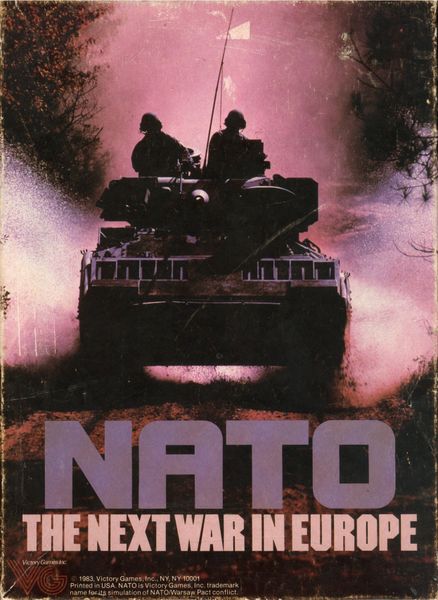NATO: The Next War in Europe (1983) Board Game
NATO: The Next War in Europe is a wargame released in 1983, designed by Ted Koller and published by Victory Games. It is set during a hypothetical World War III scenario in which NATO forces defend Europe against a Warsaw Pact invasion. The game is known for its strategic depth and realistic simulation of modern warfare tactics.
Game Components of NATO: The Next War in Europe
How To Setup NATO: The Next War in Europe
Setup involves preparing the game map, sorting and placing the counters according to the scenario chosen, and distributing the player aids. Each scenario has specific setup instructions, including the placement of initial forces and reinforcements. For instance, the “Strategic Surprise” scenario requires setting up forces for a sudden Warsaw Pact attack, while the “Extended Buildup” scenario involves a more gradual deployment of forces by both sides.
Gameplay Mechanics and Game Objective
Player Experience
Playing **NATO: The Next War in Europe** is a deeply strategic and immersive experience. The game requires careful planning and adaptability, as players must manage supply lines, execute combined arms operations, and make critical decisions about where to concentrate their efforts. The game flows smoothly after a few turns of familiarization, allowing players to focus on strategy rather than rules.
Pros
Cons
Personal Thoughts on NATO: The Next War in Europe
**NATO: The Next War in Europe** is ideal for experienced wargamers and those with a deep interest in Cold War military strategy. The game’s complexity and depth make it less suitable for casual gamers, but it offers a highly rewarding experience for those willing to invest the time. The updated Designer Signature Edition is a must-have for anyone who appreciates the meticulous detail and historical accuracy that Bruce Maxwell has brought to this classic game.
We are supported by our audience. When you purchase through links on our site, we may earn an affiliate commission, at no extra cost for you. Learn more.

